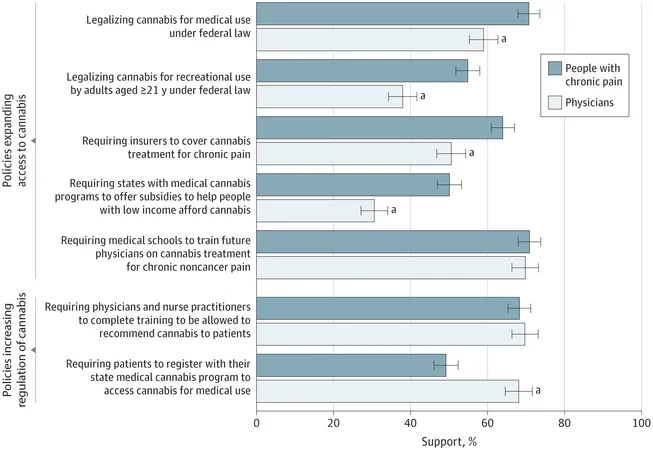
A Surprising Divide: Chronic Pain Patients Favor Cannabis Access More Than Doctors, Study Reveals
2024-10-02
Introduction
In a groundbreaking study from Rutgers Health and other institutions, researchers have uncovered a striking disparity between the support for cannabis access among adults suffering from chronic pain and the physicians treating them. The study, published in JAMA Network Open, surveyed over 1,600 chronic pain patients and 1,000 doctors across states that have medical cannabis programs, revealing that a significant 71% of chronic pain sufferers advocate for the federal legalization of medical cannabis, in contrast to only 59% of physicians.
Complexities of Cannabis Legislation
Elizabeth Stone, a core faculty member at the Rutgers Institute for Health and lead author of the study, highlighted the complexities of cannabis legislation, stating, “Cannabis occupies a unique space due to its complicated policy landscape.” The legality of medical and recreational cannabis varies by state, with some states fully embracing legalization while others impose strict prohibitions, underscoring the urgent need for clear, standardized regulations.
Current Legal Status of Cannabis
Currently, there are 38 states plus Washington, D.C., that have legalized medical cannabis, with 24 states (including New Jersey) allowing its use for adult recreational purposes. Nevertheless, at the federal level, cannabis is classified as a Schedule I controlled substance, which stigmatizes its use and complicates research efforts.
Patient and Physician Perspectives
Among the study participants, 55% of chronic pain patients and only 38% of physicians supported the idea of federal legalization for recreational cannabis. Moreover, 64% of patients favored insurance coverage for cannabis treatment of chronic pain, contrasted with 51% of physicians.
Influence of Personal Experiences
Remarkably, personal experiences with cannabis heavily influenced the opinions of both patient and doctor groups. Patients who had utilized cannabis for pain management were the most enthusiastic advocates for expanded access, whereas doctors who had not recommended cannabis were more likely to oppose it.
Need for Education
The study further emphasized the overwhelming consensus for better education regarding cannabis for doctors, with around 70% of both patients and physicians advocating for inclusion of cannabis treatment in medical school curricula. This suggests a critical shift may be needed in medical education to equip future healthcare providers with the knowledge and tools necessary to navigate cannabis treatments effectively.
Future Guidance and Research
“Future guidance regarding cannabis use and its effectiveness is essential,” Stone remarked. She emphasized that clarification on whether doctors should be recommending cannabis, and the specific considerations related to different cannabis products and methods of use, is crucial for advancing care in chronic pain management.
Restrictions on Research
Unfortunately, researchers noted that federal restrictions currently hinder the ability to conduct comprehensive studies on cannabis use. Advocates argue that federal legalization could alleviate these restrictions, paving the way for essential research that could enhance understanding of cannabis’s pain relief efficacy.
Conclusion
The conversation around cannabis access is rapidly evolving, and as this study reveals, the voice of chronic pain patients advocates for a more open and supportive approach compared to their physicians. With the landscape of cannabis legislation continuously changing, both patients and healthcare providers must engage in dialogue to bridge this significant gap in understanding and access.

 Brasil (PT)
Brasil (PT)
 Canada (EN)
Canada (EN)
 Chile (ES)
Chile (ES)
 España (ES)
España (ES)
 France (FR)
France (FR)
 Hong Kong (EN)
Hong Kong (EN)
 Italia (IT)
Italia (IT)
 日本 (JA)
日本 (JA)
 Magyarország (HU)
Magyarország (HU)
 Norge (NO)
Norge (NO)
 Polska (PL)
Polska (PL)
 Schweiz (DE)
Schweiz (DE)
 Singapore (EN)
Singapore (EN)
 Sverige (SV)
Sverige (SV)
 Suomi (FI)
Suomi (FI)
 Türkiye (TR)
Türkiye (TR)